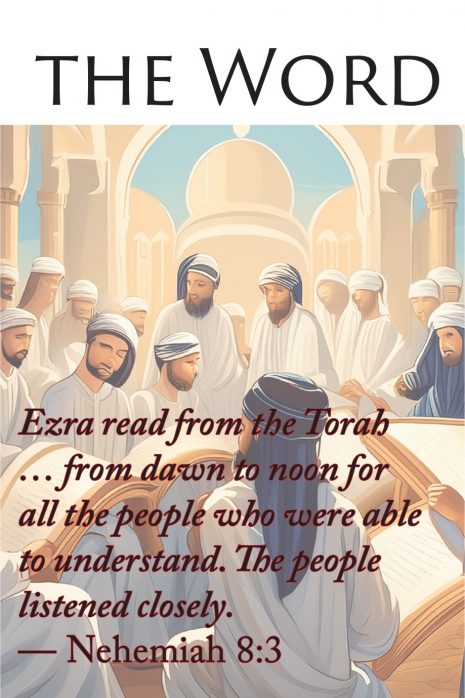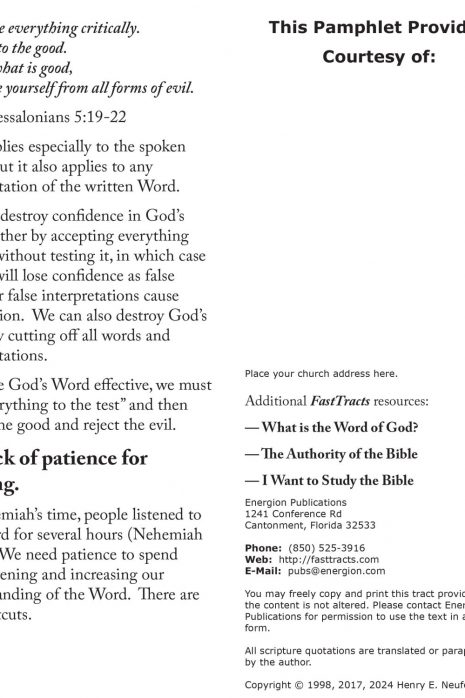Seven Barriers to Hearing the Word
$0.00 – $0.85
Personalization
If you choose “Download Only” you can download as many copies of this pamphlet as you wish. You do not need to specify a number. If you choose “Printed” or “Printed and Folded” the order includes printing of the number you select, and personalization is available free of charge. You can email us (pubs@energion.com) information regarding personalization. Please check the available area on the specific pamphlet, but 3″ x 3″ fits most, and it is best to create a graphic at 300 dpi. We can also format simple text for you. You will receive a PDF preview before printing.
Description
Original PDF pamphlet version of FastTracts booklet by the same title. You have permission to copy and print this as much as you want as long as it is not modified in content, other than to fill in the personalization section.
There is one downloadable file, an 8 1/2″ x 14″ file to be printed on the same size paper, which will include margins.
You can order any number of these files printed and shipped with optional folding, but note that you can take the files and have them printed and trimmed at most office services stores.
Pamphlet Content:
Many people have trouble enjoying the scriptures and finding power in and through them. They find that the written word is boring or incomprehensible, and so they don’t get the benefit of the living word.
There are seven barriers to really hearing God’s Word. Break down these seven barriers and you will find that your experience of reading the Word will become more rewarding and will be a source of God’s power in your life.
We lose the power and excitement of the Word when . . .
1. We don’t know what the Word is.
God’s Word is not limited to the written word. God created the universe through His Word (Psalm 33:6-9). Jesus was God’s Word in human form (John 1:1-3, 14). God’s Word is reflected throughout creation (Romans 1:20). The written word is God-breathed (2 Timothy 3:16, 17) and it is useful. The Word in all its forms is alive and active (Hebrews 4:12).
Alive is what God’s Word is and active as well! It’s sharper than a two-edged sword. It can penetrate right into our deepest selves and judge our desires and thoughts.— Hebrews 4:12
2. We divorce the Word and the Spirit.
The original reception of the Word, our understanding of it, and its application are all brought about by the power of the Holy Spirit (2 Peter 1:19-21). When we separate the Word from the Spirit that gave it, it becomes a collection of dry facts. The Word should have the power to transform lives, but it can only do that when we allow it to work on our hearts and lives through the power of the Spirit.
The Word is not just a matter of reading, but of hearing and of obedience.
I want to hear what God,
the Lord has to say,
For he will speak peace to his people,
to his faithful ones,
to those who turn to him inwardly.
— Psalm 85:8
3. We make the Word a scholarly rather than a spiritual study.
Scholarship is important in studying the Word, but we do not merely study in order to know facts; we study in order to know God. Further, we don’t study to know about God; we study to know God.
When we see the study of the Word as a scholarly pursuit we will often study more about the Word than we study the Word itself. Studying what others say about Scriptures can be valuable and is often necessary, but it is no substitute for studying the Word for yourself.
The natural person doesn’t take in things revealed by God’s Spirit. They seem like incomprehensible foolishness because they are to be judged spiritually. The person who is spiritual, however, takes in all these spiritual things and is not judged by anyone.
— 1 Corinthians 2:14, 15
4. We limit the study of the Word to a few rather than all.
The Bereans are commended for studying the Scriptures for themselves to see whether Paul’s teachings were accurate (Acts 17:11). Jesus asked the young ruler how he read the scriptures (Luke 10:26). Part of the power of the Word is that God communicates with each one of us through it if we open our hearts to hear.
5. We limit the Word to church events, programs and curricula.
I am deeply filled with longing
for your judgments constantly.
— Psalm 119:20
Church members often leave teaching and learning the Word to church programs and events, sometimes because of laziness and sometimes just because they don’t know how to study it or are afraid to study.
If we are consumed with longing for God’s Word at all times, then we will want to study it at home as well as at church or school. We will want to know for ourselves what it says and how it applies to our lives.
6. We lack discernment and courage to apply that discernment.
Don’t snuff out the Spirit
As for prophecies, don’t ignore them.
Examine everything critically.
Hold onto the good.
Accept what is good,
Distance yourself from all forms of evil.
— 1 Thessalonians 5:19-22
This applies especially to the spoken Word, but it also applies to any interpretation of the written Word.
We can destroy confidence in God’s Word either by accepting everything as true without testing it, in which case people will lose confidence as false words or false interpretations cause destruction. We can also destroy God’s Word by cutting off all words and interpretations.
To make God’s Word effective, we must “put everything to the test” and then accept the good and reject the evil.
7. Lack of patience for hearing.
In Nehemiah’s time, people listened to the Word for several hours (Nehemiah 8:1-8). We need patience to spend time listening and increasing our understanding of the Word. There are no shortcuts.
As an Infographic:
Additional information
| Pamphlet Form | Download Only, Printed, Printed and Folded |
|---|










Reviews
There are no reviews yet.